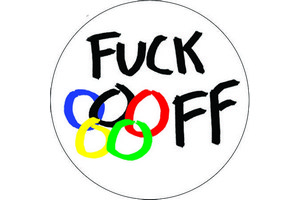Mama don't 'low no 'lympic play'n round here
 The other day, I was asked if I had watched the opening ceremony of the Olympics on television. I indicated that I did not follow Olympic sport as I considered it a huge waste of public money. Sensing uneasiness in my inquisitor's demeanour, I did not elaborate further, allowing our conversation to move in a different direction. Upon reflection, and given the current Olympic climate, an elaboration of those misgivings now seem appropriate.
The other day, I was asked if I had watched the opening ceremony of the Olympics on television. I indicated that I did not follow Olympic sport as I considered it a huge waste of public money. Sensing uneasiness in my inquisitor's demeanour, I did not elaborate further, allowing our conversation to move in a different direction. Upon reflection, and given the current Olympic climate, an elaboration of those misgivings now seem appropriate.
Is there any task more irrelevant than the discus, the shot put or, I daresay, the hammer throw? What possible purpose, other than perhaps jumping over turnstiles in the Toronto subway, can a hurdler serve? Being able to jump over a picket fence doesn't mean you can outrun the angry dog snapping at your heels. When the ship they're passengers on capsizes in the North Atlantic, it will matter little whether or not the synchronized swimming team were gold medal contenders. The laws of physics trump any concept of ability and artistic content ensuring that hypothermia will overtake them, more or less, at the same time. "Woohoo! Way to go team!" I don't want to praise a man like Albanian Hysen Pulaku who, prior to hoisting an inordinate amount of weight, plies himself full of toxins. I'd prefer to pay homage to a guy like Gerald du Plessis who, after hoisting an inordinate amount of weight helping renovate a cottage, allows his body to be plied with toxins. "Can I interest you in another ambient Old Milwaukee there, Big Doc?"
The irrelevance of Olympic sport is second only to the sheer and utter waste of public money spent to support it. Given the last paymment for Morntreal's Olympic Stadium was made in November 2006, some 30 years after the world's descent on Canada for the '76 Olympics, can it rationally be argued that the pommel horse provides good value for the money? Montreal's Big Owe left the Canadian taxpayer burdened with an astounding $1.5 billion debt. Canada's population, according to Statistics Canada, stood at a mere 23,449.791 that same year. In other words, the 1976 Olympics cost every man, woman and child in this country $63.97. The average man might be persuaded to cough up $63.97 to catch Olympic poll dancing if strippers were considered athletes and the event were licensed. But no self-respecting man would be caught dead shelling out $63.97 to watch Olympic badminton. Sorry dude... that's just not gonna happen.
No critique of the Olympics would be complete without some thoughts on doping. If the International Olympic Committee truly wanted to take a firm stance on doping, they'd not only strip any athlete testing positive for a banned substance of their medals, they'd also strip the country the athlete represented of ALL medals as well. Given that they're likely too chickenshit to adopt such a stance, then perhaps the only pragmatic alternative is to run a parallel Olympics which encourage the use of steroids and growth hormones. I'd suggest the SterOlympics. Given there's no apparent shortage of morons willing to ingest toxins in their quest for the gold, it seems only fitting that the SterOlympics should be funded entirely by the same pharmaceutical companies who produce these poisons.
Finally, it's not the Olympics I find abhorrent; it's the spending of public monies subsidizing the Olympics I find abhorrent. Every single conversation I've ever had with anyone who feels public money should be used to support the Olympic effort goes something like this:
"It's good for the country!" the pro-Olympic advocate argues.
"Really?" I question, "How is it good for the country?"
"The games generate revenue for the economy." is the common response.
"The 1976 summer games cost us 1.5 billion dollars which took 30 years to pay... how much revenue did the games generate?", I ask.Inevitably, the pro-Olympic advocate cannot answer the question but offers instead, "The games make us feel good."
"They make us feel good?" I question. "Some people might argue that snorting coke off a hooker's ass makes them feel good too but I don't see that as a legitimate justification to subsidize the recreational activty with public monies, do you?"
Ironically, the conversation always seems to end rather abruptly at that point.
Submitted by Norm de Plume, 02 August 2012